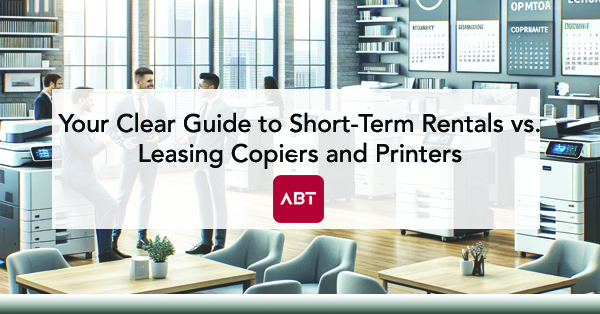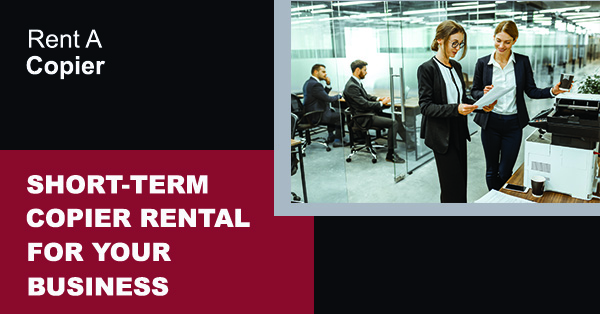
How to Find the Best Office Equipment Lease in Colorado
Navigating the world of office equipment management can be as intricate as it is crucial for the smooth operation of your Colorado business. Among the most pivotal decisions you’ll face is choosing between short-term rentals and leasing for your copiers and printers. This choice not only impacts your operational efficiency but also your financial flexibility.
Let’s take a look into the nuances of each option, exploring their structures, terms, and the types of equipment you might include in a lease. Furthermore, we’ll arm you with essential questions to ask your account executive, ensuring you make an informed decision tailored to your business needs.
When Are Short-Term Rentals Best?
Short-term rentals offer a quick and flexible solution for businesses facing immediate, albeit temporary, printing and copying needs. Whether it’s a spike in workload, a specific project requiring high-quality prints, or a stopgap during equipment maintenance, short-term rentals can fill the void without the long-term commitment.
Short-term rentals of copiers and printers can be a strategic move for businesses navigating various operational scenarios. These rentals offer flexibility, reduce upfront investment, and ensure that specific, often temporary, needs are met without long-term commitments. Here are typical situations where short-term rentals prove most useful:
- Temporary Projects: For businesses undertaking short-term projects that require increased printing or copying capacity, renting equipment can meet the demand without the need for a long-term investment.
- Events and Conferences: Events, trade shows, and conferences often need on-site printing facilities for brochures, agendas, and other materials. Short-term rentals can provide the necessary equipment on location, tailored to the event’s duration.
- Seasonal Peaks: Many businesses experience seasonal peaks in workload, requiring additional resources during busy periods. Renting extra copiers or printers can accommodate the increased demand without affecting the efficiency of regular operations.
- Testing New Technology: Companies considering an upgrade of their office equipment might rent the latest models short-term. This allows them to evaluate new features and performance before committing to a lease or purchase.
- Business Start-ups: New businesses may opt for short-term rentals to avoid hefty initial investments while still accessing the technology needed for operations. This flexibility allows for more fluid cash flow management in the early stages.
- Temporary Offices: For businesses setting up temporary offices—perhaps during renovations, relocations, or while testing new markets—short-term rentals can equip these spaces without the need for long-term contracts.
- Disaster Recovery: In the aftermath of disasters, such as fires or floods, businesses may need to quickly replace damaged equipment to maintain operations. Short-term rentals offer a rapid solution to get back up and running.
- Contract or Freelance Work: Freelancers and contractors working on specific projects might need access to high-quality printing and copying. Rentals can provide the necessary equipment without the long-term commitment.
- Equipment Downtime: When primary office equipment undergoes maintenance or repair, a short-term rental can fill the gap, ensuring that business operations continue smoothly without significant downtime.
- Research and Development (R&D): Companies engaged in R&D activities might need specialized printing or copying equipment for a limited period. Rentals can offer access to the required technology on a project basis.
Short-term rentals provide an adaptable solution for businesses facing these and other temporary or project-based needs, ensuring operational continuity and financial flexibility.
Duration: Typically, short-term rentals span from a few days to several months, catering to immediate business requirements or project-based needs.
When is Leasing Copiers and Printers Best?
Leasing, on the other hand, is a commitment for the longer haul. Leasing provides your business with the latest technology without the substantial upfront cost of purchasing. Leases usually come with maintenance and service agreements, ensuring that your equipment remains in peak condition without additional charges for repairs or servicing.
Duration: Leasing terms can vary significantly, but they generally range from one to five years, offering a balance between technological relevancy and manageable payments.

How are Copier Leases are Structured?
Leases are primarily structured in two ways: Fair Market Value (FMV) Leases and $1 Buyout Leases.
- FMV Leases: At the lease’s end, you have the option to purchase the equipment at its fair market value, return it, or renew the lease. This option is ideal for businesses that aim to keep up with the latest technology without the burden of ownership.
- $1 Buyout Leases: This structure allows you to own the equipment outright at the lease’s end for a nominal fee of $1. It’s suitable for businesses confident that the equipment will still meet their needs beyond the lease term.
Beyond Copiers and Printers: What Else Can You Lease?
Leasing isn’t limited to copiers and printers. You can bundle various office equipment under a single lease agreement, simplifying management and potentially improving terms. This can include:
- Managed IT Services Equipment: Servers, workstations, and network hardware to support your business operations.
- Managed Print Services Equipment: Beyond printers and copiers, this can encompass high-volume printers, specialty printers, and related supplies management.
- Access Control Systems: Including badges, readers, and software to secure your premises.
- Unified Communications as a Service (UCaaS) Equipment: Phones, conferencing systems, and other communication tools.
Critical Questions to Ask Your Account Executive
Before entering into any lease agreement or opting for a rental, equip yourself with all the necessary information. Here are crucial questions to pose to your account executive:
- What are the total costs associated with the lease or rental, including service and maintenance?
- Can the lease be customized to fit changing business needs?
- What happens at the end of a lease term? What are the options and associated costs?
- What is included in the maintenance and service agreement?
- How quickly can service or repairs be expected, and are there loaner options available during downtime?
- Are there any penalties for early termination of the lease?
- What are the insurance requirements for leased or rented equipment?
- How does the equipment get upgraded or replaced under the lease agreement?
Making the choice between leasing and renting office equipment such as copiers and printers depends heavily on your business’s current needs, financial flexibility, and future growth plans. By understanding the specifics of each option and asking the right questions, you can ensure that your decision aligns with your business strategy, ensuring operational efficiency and financial prudence. Whether you’re steering a startup through its formative years or guiding an established enterprise through expansion phases, the right approach to managing your office equipment can significantly impact your success.
Is your business gearing up for a seasonal peak, embarking on a special project, or simply in need of high-quality printing solutions without the long-term commitment? Discover the flexibility and efficiency that short-term copier and printer rentals can bring to your operation. With customizable options tailored to meet your specific needs, our rental services ensure you have the technology to support your business’s demands, exactly when you need it. Don’t let temporary needs lead to permanent expenses.
Contact us today to explore how our short-term rental solutions can seamlessly support your project’s success, enabling you to focus on what you do best – growing your business. Act now and unlock the potential of flexible, cost-effective printing solutions.
